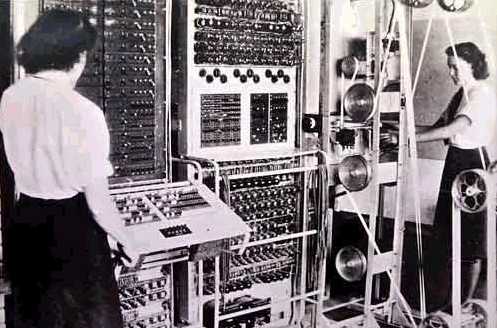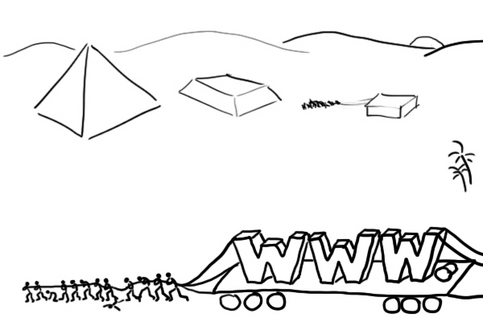|
Now before you assume I’m one of those who detest, or are petrified of technology, I’m not. I work on a laptop/desktop, browse online, giggle at Twitter, waste time on YouTube, and yawn at LinkedIn. I even do all this on my phone. But increasingly, it feels like I’m trying to run a marathon alongside a cheetah. No matter how many warm-ups I do or how much water I drink, it feels like it’s always miles ahead, somewhere on the horizon, while I’m gasping, clutching my stomach, stumbling alone crying, “Wait up!”. But technology doesn’t give a shit. It keeps sprinting further, a wise and evil grin on its face.
A few years back I got a smart phone. In those days they had a QWERTY keyboard. You need to have fingertips the size of a two-year old to type fast on those. Incidentally, most two-year olds do type faster than me. Nevertheless, with practice and patience I became fast and quick at typing, even with my fat fingers. The moment I was really good at it, everyone got a touch screen phone. One day I was buying tomatoes when I had to message someone. The bhajiwalla cracked up watching me struggle. “Madam, smart fone le lo! (Madam, get a smart phone!)” He waved his sleek golden iPhone at me. I became as red as the tomatoes and upgraded the next week. Now I’m happy with this touch screen business, but I’m struggling to keep pace with the apps. Companies suddenly decide they will shut down their websites and provide only the app. Every hour some app or the other needs an upgrade, and cries for attention, like an annoying baby with loose motions. The other day I was talking to a friend about how we used to chat over landlines. Her 15-year-old cousin was in the room, playing some video game on his phone. He overheard us and looked petrified. Turns out, he thought landlines were the cousins of landmines, and we used explosives. Now that’s what mobile technology does to people’s brains. It’s called a smart phone because it’s often smarter than it’s owner. And it’s not limited to phones. For some reason, Gmail will keep twiddling with their user-interface. They say it’s for ‘improvement’, but it sends people like my mum into a flap. By the way, I’m now a Google Help Centre. I spend hours answering questions like this: “Where has the password space gone?” “I can’t find Drive? Where did they put it?” “How do I see this attachment?” “Where did reply-all go?” “What is the green circle near my name?” I keep reassuring mum that a computer is a) a machine b) does not think but only follows orders and c) will never bite her or explode. I want Google to either give their employees something better to do, or pay me as a Help Centre. I started using a computer for work in 2001. Floppy disks were on their way out, and compact disks were on their way in. That was the last time I was actually riding the crest of the technology wave. After I had a massive collection of CDs, they vanished overnight and were replaced by the USB drive. And then they made USB drives so tiny, that I was forever losing them. So I started swallowing them for safekeeping. All my work is saved on little USBs somewhere in my intestine. It couldn’t be safer. Passwords have become tricky fellows. They can no longer be sensible words like ‘woof’, or ‘password’. Websites prompt me to use my great-granduncle’s middle name, the date of the Crimean War, then type it all backwards with random capitalized letters. Besides, we’re told not to keep the same password across different websites. I’ve been working on my very own Encyclopaedia of Passwords, and I’m on Volume 3. I suggest you do too. Now of course, everything is ‘in the cloud’. All our words, photos, thoughts, opinions, lives, are floating in one massive nest somewhere in the sky. This should make things easy, and it does, to a large extent. I’m just waiting for the day we can upload our brains to the cloud. But I suspect that some people (like that 15-year old I told you about), already have. Also published @medium
0 Comments
Now I haven't done many sites, but the amount of misconceptions out there are astounding. Here's a few.
1) A site can be done in a day: Yes a few sites can perhaps be done in a day, but don't expect anything great. A website is not a blog. 2) No one reads: This is a classy one, one of the oldest in the book, and is genuinely and tragically believed by several designers too. That's why a lot of content out there sounds like blah blah blah. People can't really get solid information and facts from blue rectangles, moving stars, or purple stripes. Even photographs have their limitations, that's why they come with that little thing called captions. Words matter. And if you think they don't, you may have to eat your words. They aren't even that tasty. 3) Only look and feel matters: The term look and feel is frequently applied to any kind of visual design. This is like applying band-aids to cure jaundice. It just doesn't work. If the design is weak, all the surface cosmetics just won't help. And websites run way deeper than the page you see. 4) Interactive is cool, hep and in: Interactive is a word that should be banned (more on banned words later), along with other terms such as look and feel, cutting-edge, innovation and creative. These words have become as generic as 'nice' and 'good'. These poor words meant something once, in a glorious past, but now their value has dimished, and they are joining the ranks of 'jargon'. Interactive could mean anything. You and me talking is interactive. Interactive site may not equal functional site. ("This site is Awesome! But I've been looking for the Home page since yesterday.") 5) Flash is best: Steve Jobs doesn't use Flash in any Apple products. That says it all. Still looking for more proof? It makes things slow, provides pointless animations, and doesn't really have any function online. Out of 1000 websites using Flash, only one really probably needed it. It also looks like the website was created in 1742. BCE. ("I designed this site when Rameses II was building pyramid 3.") 6) Everyone uses the internet now: That's in a world where 'everyone' is 22 years old, wears Levis and eats at Subway. Thankfully, we don't live there yet. The real world has many forty-plus people who are not completely comfortable with the internet. Many small-town people may not be using it everyday. The worst mistake a designer can make is to assume everyone is just like them. Internet users are like underwear users. They can be anyone, anywhere, and you got to make something that is comfortable for all of them, however diverse they are. 7) Crack the home page and you are done: That's why the web is littered with home pages that are ornate, flashy, 'interactive', non-functional and look nothing like the other pages of the site. Inside pages need to be as functional and friendly as the home page. A home page needs to reflect the rest of the site without charging at you and knocking you flat with 1200 links. Or knocking you down with nothingness. Happy website-ing! |
Archives
June 2018
Categories
All
LinksThe New Yorker Old Blogs |


 RSS Feed
RSS Feed
